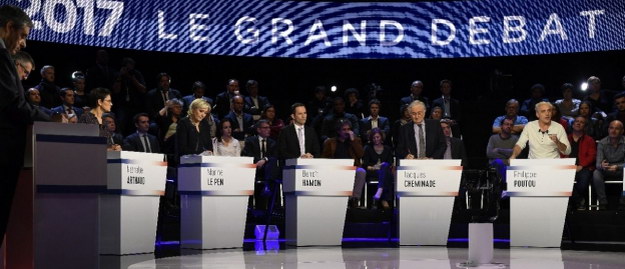Nadiya Koval, for the “European Pravda”
On the evening of the 4th of April the second presidential debate that set a national record for the number of participants took place in France.
The five leading candidates with current rating higher than 10% were joined by 6 more candidates of a various degree of marginality. Their aggregated presidential rating does not exceed 6%, and their political views vary from the radical left – to ultranationalist, up to an immediate withdrawal of France from the EU.
Discussion in “11 candidates” mode appeared to be quite a chaotic one. Within three hours each of the candidates has been talking about what’s dear to his/her heart, mostly about domestic policy issues.
Nevertheless, some theses important for Ukraine were also discussed.
Le Pen announced that the elections in France are of a civilizational importance; Fillon swore to make France the most powerful country in Europe in 10 years, and Hamon – the only one of all candidates – has pledged from the start to ruthlessly fight against Putin’s Russia.
Yes, this is not a misprint. This is the first conclusion of the Tuesday’s debate in Paris.
Benoit Hamon, the candidate from the Socialist Party who is even not supported by the most of the party itself (even for the former Prime Minister Valls his recent opponent Macron is more agreeable than Hamon), was the only candidate who has consistently and clearly condemned Putin’s aggression in Ukraine. A week ago this position was one of the factors setting him apart from the other radical left candidate Jean-Luc Mélenchon who makes no secret of his sympathy for the current Russian leader.
During the debate, in particular during the minute allowed for the participants’ assigned presentation in the beginning of it, Amon highlighted that his desire was to be a president who would “fight against Putin, against Trump”.
The other debate members’ thoughts were fundamentally different.
The most of them sidestepped the Russian topic. And the vividly pro-Russian views could be heard from those who referred to it (Fillon once again stressed the importance of cooperation with Russia for conquering of the “Islamist totalitarianism”), as well as the vague references to commonality of the terrorist threats to France and Russia in connection to the attack in Saint-Petersburg (this argument was heard from Macron).
Secondly, the debate has shown political flexibility which Marine Le Pen is capable of on her way to the cherished presidency.
If in February she put Frexit and the withdrawal of France from the Euro zone among the first requirements of her pre-election rhetoric, now she (obviously, in order not to scare away a part of the voters) has slightly softened her position.
Le Pen promises that if she wins the election she will negotiate with the EU over the issues of changes to the fundamental agreements, and will ask the opinion of the French about the EU membership in a referendum. It is quite a familiar scheme, isn’t it?
During the debate the supporter of sovereignty François Asselineau has accused Le Pen in withdrawal from her own program, and started to prove the need of Frexit himself, deftly juggling with articles and quotations from the European treaties and demanding to immediately follow the example of “the wise British” and write a farewell letter to Donald Tusk.
However, currently this position cannot save Asselineau: his rating remains at the level of a statistical error.
Thirdly, the debate proved that the issues of political morality and fighting against corruption are as relevant in France as they are in Ukraine.
In this context, the Trotskyist and labour unions’ representative Philippe Poutou became a high spot of the evening.
Firstly, he blamed Fillon for simultaneously defending the policy of austerity and pinching from public funds. And then he said the same about Marine Le Pen, with the only difference – the funds in her case were the European ones: “National Front is supposed to be anti-system, but isn’t bothered because it’s protected thanks to parliamentary immunity”.
“When we are summoned to appear before police – we go there, as there is no immunity for workers!” – Poutou finalized his speech with a roaring applause.
This debate may be the last in the political rally in France, as a part of leading candidates withdrew from participation in the third round, which is set for April 20, just days before the first round.
In any case, this debate has already become particular and put a spin on the politicians.
As each of the speakers was allotted 1.5 minute, the minor candidates in their attempts to convey as much information about themselves as possible were gabbling like machine guns, and at top volume. In contrast, the main contenders were not much focused on a detailed presentation of their programs, but on creating a visual image of “presidency” – posture presidentielle, speaking relatively calmly, rhythmically, and seriously.
First of all, the participants discussed three issues: security and counter-terrorism, return to morality in political life, as well as jobs for the French. In connection to the last issue the candidates had to disclose their attitude to the EU (most of the contestants except Macron appeared to be generally sceptical about it).
As you can see, Ukraine and Russia are not included in this list; the topics which are important to us were mentioned rather superficially.
Summarizing the above, the debate on April 4 brought more of vivid emotion than of programmatic clarity, especially concerning the candidates’ views on foreign policy.


Вам також буде цікаво:
How many billions of dollars does Ukraine lose on smuggling
WHY THE UKRAINIAN PUBLIC ORGANIZATIONS IN EDUCATION AREA SHOULD UNITE?
British military expert on what the president should be
THE TERMINATION OF RAILWAY CONNECTION WITH RUSSIA CAN BE INTERPRETED AS A LACK OF STRATEGY – VLADIMIR SHULMEISTER
Anatoliy Amelin: year 2019 will be critical for the economy of Ukraine
CHAOS AND DISORDER IN IRAQ: WHY CAN’T A NEW COALITION BE FORMED?